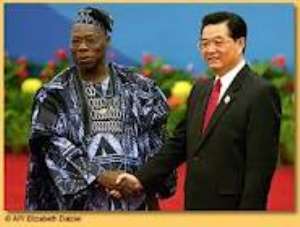
The Chinese are aiding African countries with finance and infrastructural development, investing in multibillion-dollar projects in roads and transport, schools, hospitals and stadia.
As Africa's largest trading partner, the socio-economic benefits of the Chinese new found love with Africa looks enticing and welcomed.
But there is growing concern for African leaders to beware of the inherent dangers of organized crime involving Chinese dissidents migrated into Africa as part of the investment package.
In the past three months alone, the Chinese have been in the headlines for all the bad reasons across Africa.
In Nigeria, 13 Chinese nationals were arrested on suspicion of engaging in prostitution in the country.
Some of the Chinese nationals allegedly connive with some Nigerians to traffic teenage girls into the country under the pretext of offering them jobs in factories.
Preliminary investigation by the Nigeria Immigration Service confirmed that most of the women were sponsored into the country by some "criminal human traffickers who are currently at large".
Earlier, the Nigerian immigration officials had arrested 45 Chinese nationals for alleged illegal textile trading – the Chinese workers had been engaged in "lowly rated activities" that should be reserved for Nigerians and were "depriving them of job opportunities".
In Kenya, there are agitations for Chinese citizens engaged in hawking business without valid work permits and documents to be arrested, prosecuted and deported.
The local traders claim the Chinese hawkers are driving them out of business with cheap, substandard and subsidized goods.
Similar concerns have been raised by traders in Ghana, leading to the establishment of a taskforce to flush out foreigners in the country's retail business.
Groups of Chinese nationals have also been arrested in a series of crackdowns for allegedly mining gold illegally – hundreds of the Chinese are reported to be engaged in illegal mining in the West African country.
A special Chinese police force operated in Angola to extradite 37 suspected gangsters from Angola, who were arrested for alleged crimes such as kidnapping, armed robbery, extortion, human trafficking and forced prostitution.
In South Africa and Zimbabwe, Chinese nationals have been arrested for diverse criminal offenses.
An April 2010 Editorial titled “Chinese Organised Crime and Africa” by Dr. Gary K. Busch stated that: “Chinese organised criminal entities operate in virtually every African state, especially where there is a sea coast and a mining/extractive industry. The Chinese are not the exclusive organised criminal structures in Africa but they have some unique niche markets”.
Indeed, the situation of the involvement of Chinese organised crime in Africa is becoming very serious and alarming.
In an era where there have been arguments for powerhouses like the United States to yield gracefully to China's rise, can volatile Africa overcome the tide of Chinese crime?
The America Foreign Policy, a Princeton Student Editorials on Global Politics reported that “while China's relationship with the countries of Africa may strictly not qualify as that of a neocolonialist nature, there are critical problems in the way it deals with local populations that alienates them and generates resentment… It is ultimately in China's own interest to review its involvement in Africa in order to sustain its economic growth and maintain its international credibility”.
Africa is said to be the next big success to hit the world after been battered with slavery and colonialism. But leaders on the continent would need to have a critical thinking and fashion out policies that inure to the common good of the African.
Story by Kofi Adu Domfeh




 Avoid pre-registered SIMs, buyer and seller liable for prosecution – Ursula Owus...
Avoid pre-registered SIMs, buyer and seller liable for prosecution – Ursula Owus...
 Election 2024: Mahama has nothing new to offer Ghanaians, Bawumia is the future ...
Election 2024: Mahama has nothing new to offer Ghanaians, Bawumia is the future ...
 OSP files fresh charges against ex- PPA Boss
OSP files fresh charges against ex- PPA Boss
 Withdraw unreasonable GH¢5.8m fine against former board members – ECG tells PURC
Withdraw unreasonable GH¢5.8m fine against former board members – ECG tells PURC
 Akroma mine attack: Over 20 armed robbers injure workers, steal gold at Esaase
Akroma mine attack: Over 20 armed robbers injure workers, steal gold at Esaase
 Those who understand me have embraced hope for the future — Cheddar
Those who understand me have embraced hope for the future — Cheddar
 Ghana will make maiden voyage into space should Bawumia become President — Chair...
Ghana will make maiden voyage into space should Bawumia become President — Chair...
 Train crash: Despite the sabotage, we shall not be deterred and will persevere —...
Train crash: Despite the sabotage, we shall not be deterred and will persevere —...
 Tema-Mpakadan railway project a perversion of the original viable concept design...
Tema-Mpakadan railway project a perversion of the original viable concept design...
 Train crash: Elsewhere, everyone involved in the test will either be fired or re...
Train crash: Elsewhere, everyone involved in the test will either be fired or re...
